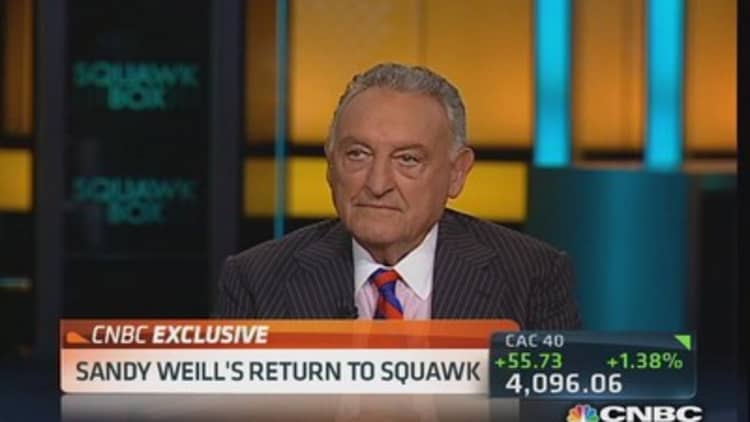As we get ready to say goodbye to the 2010s, CNBC.com is taking a look back at the key players, events and transformations from Wall Street to Silicon Valley to corporate America to the White House that shaped a "Decade of Disruption." In the lead-up to New Year's Day 2020, CNBC's online journalists will be exploring the moments that defined the past 10 years for your money and set the table for the next decade and beyond.
The banking industry underwent evolutionary change in the 2010s following the financial crisis and the Great Recession. Sanford Weill, the father of the financial supermarket, shocked Wall Street in 2012 when he called for the breakup of the sprawling institutions that were made possible by his vision. Weill, as CEO of Citigroup in the late 1990s, used the bank as the vehicle to shatter the rules of banking.
Weill walked back those remarks a year later, but the debate still rages over how to make sure that banks, or any companies for that matter, are never again so important to the American economy that the government would have no choice but to save them.
Let banks be just banks, Weill says
Four years after the collapse of Lehman Brothers and two years after the Dodd-Frank Wall Street Reform and Consumer Protection Act was signed by President Barack Obama, Weill told CNBC, in a July 2012 interview, "What we should probably do is go and split up investment banking from banking; have banks be deposit takers, have banks make commercial loans and real estate loans, have banks do something that's not going to risk the taxpayer dollars, that's not too big to fail."
"If they want to hedge what they're doing with their investments, let them do it in a way that's going to be mark-to-market so they're never going to be hit," Weill added at the time. "I think the earlier model was right for that time. I think the world changed with the collapse of the real estate market and the housing bubble and what they did in leverage in certain institutions. So I don't think it's right anymore."
What we should probably do is go and split up investment banking from banking.Sandy WeillFormer Citigroup Chairman & CEO
Weill's idea was a radical departure from the way the banking industry was fighting regulators tooth-and-nail to stay together after the financial crisis government bailouts turned bankers into public enemy No. 1. While the Dodd-Frank law in the most extreme circumstances did call for breaking up banks, it largely sought first to require institutions to have enough money in reserve to weather future financial shocks.
Who is Sandy Weill?
Now 86, Weill started in finance in 1995. He ended up heading small brokerage firm Shearson Loeb Rhoades by 1960.
Over the years, in several fits and starts, he used his dealmaking skills to eventually merge his Travelers Group insurance giant with the venerable Citicorp bank in 1998, rewriting the rules by bringing together insurance, banking and Wall Street businesses.
Known as a tough competitor, Weill has also been a generous philanthropist. He's given hundreds of millions of dollars to different causes including Carnegie Hall and Weill Cornell Medical College. He and his wife, Joan, signed The Giving Pledge in 2010 to donate most of their money to charity.
Weill was CEO of the renamed Citigroup from 1998 to 2003. He retired as chairman three years later.
Shock on Wall Street and in Washington
The day after Weill's breakup-the-banks bombshell, then-Sen. Chris Dodd, D-Conn., told CNBC that Weill's idea to force all banks to downsize is "too simplistic," arguing that "it's not just the size of an institution," but the amount of risk on its books.
The bill bearing Dodd's name, along with that of then-Rep. Barney Frank, D-Mass., sought to curb the excesses of financial institutions, which made them "too big to fail." Banks saved by taxpayer dollars in the financial crisis were deemed too essential by the government and financial regulators to be allowed to collapse like Lehman Brothers.
As it turns out, Weill came around to that thinking about a year later. He told CNBC in September 2013 that the big banks don't have to be split if the "right regulation" is in place. Reflecting on his 2012 comments, Weill said, "I got a lot more positive reactions than I thought I might. I didn't get many reactions from Wall Street, which is very understandable."
Ironically, Citigroup got the most federal financial aid during the financial crisis. According to a 2011 report from the Congressional Oversight panel looking after the 2008 Troubled Asset Relief Program, Citigroup got $476.2 billion in cash and guarantees. Bank of America was second at $336.1 billion. Morgan Stanley was third at $135 billion.




